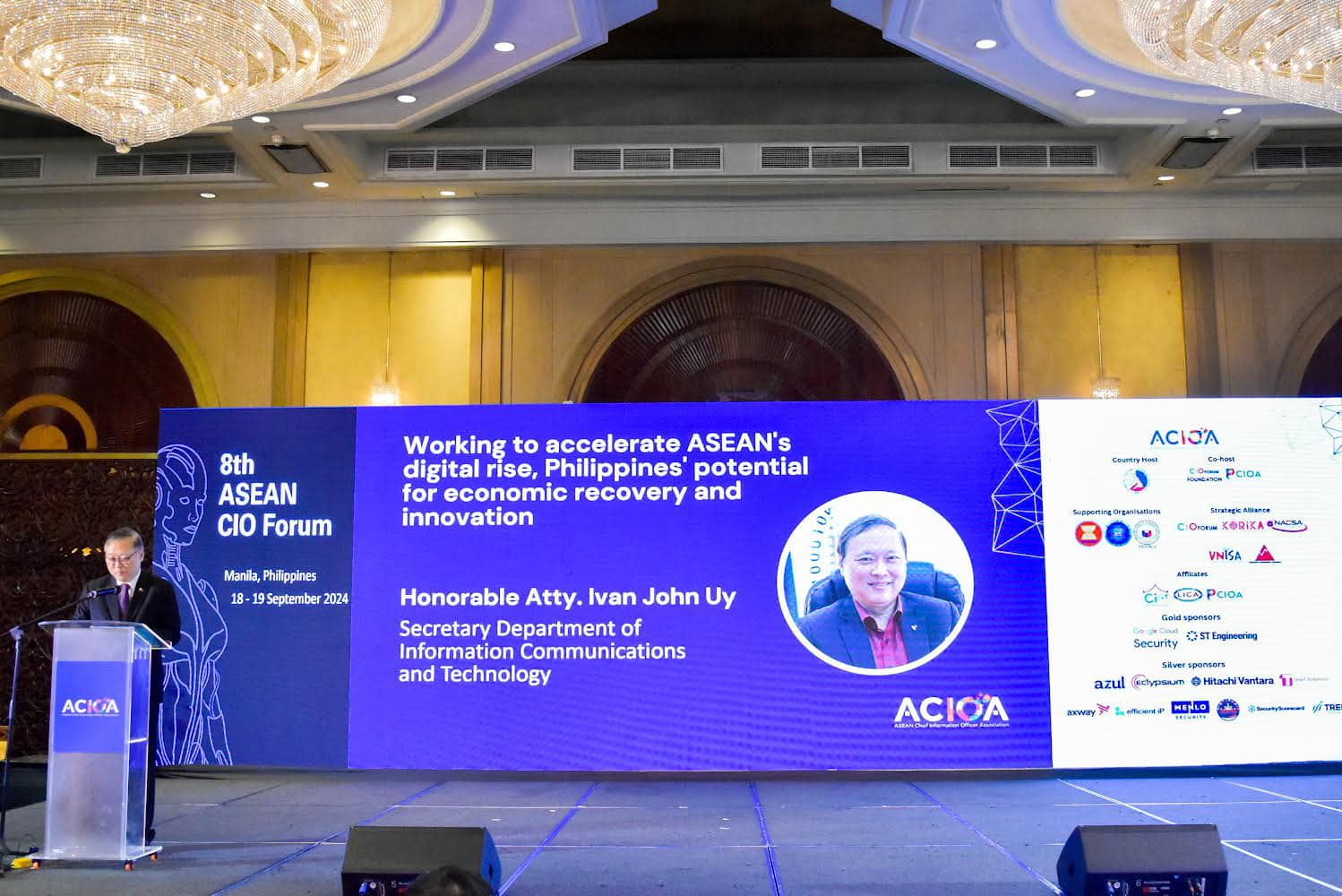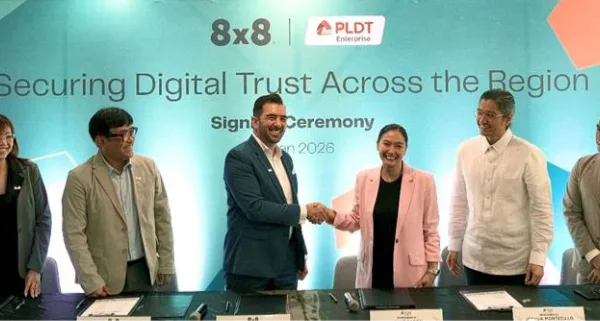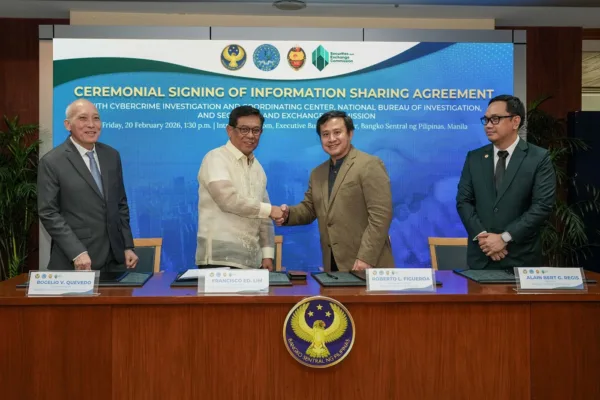The 8th ASEAN CIO forum, a major milestone in the region’s digital transformation journey, has recently concluded with over 600 C-suite executives from Southeast Asia and the Philippines participating. The event addressed critical issues such as sustainable digital growth, cybersecurity, and technological collaboration.
Jointly organized by the ASEAN CIO Association, the Philippines CIO Association (PCIOA), and the CIO Foundation, the forum underscored the importance of regional cooperation in enhancing cybersecurity, driving innovation, and forging key partnerships among ICT leaders across ASEAN.
As a crucial platform for fostering collaboration and sharing knowledge, the forum plays a vital role in advancing ASEAN’s vision for a secure and sustainable digital future.
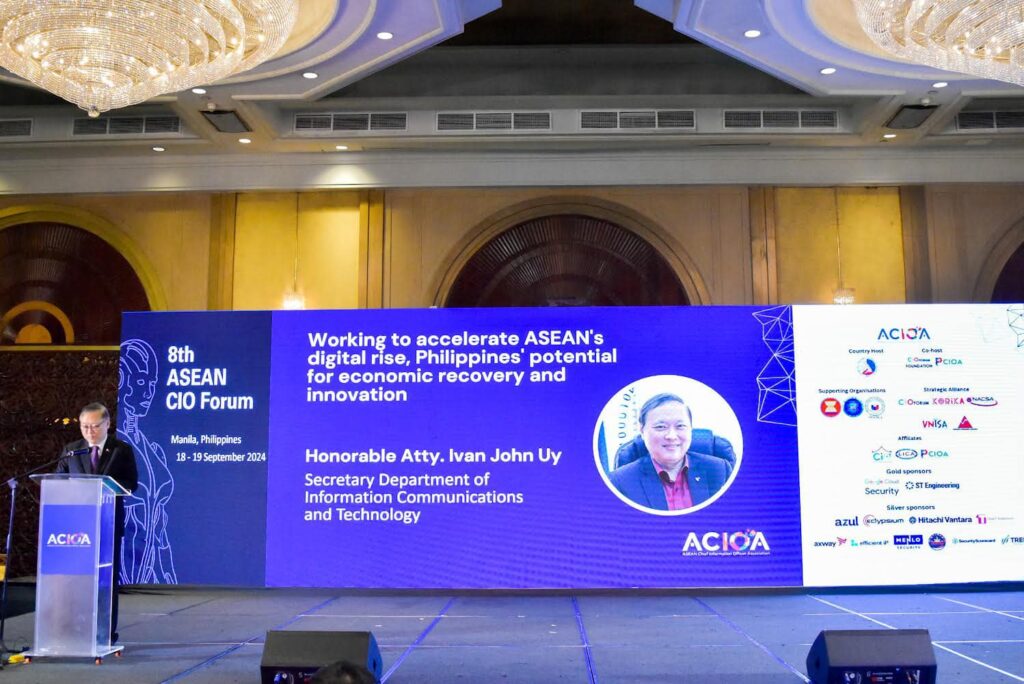
DICT Secretary Ivan John E. Uy while delivering his speech at the 8th ASEAN CIO Forum
While addressing the forum attendees in his keynote speech, DICT Secretary Ivan John E. Uy emphasized the significance of the event’s theme, “Empowering C-Suites: Pioneering ASEAN’s Sustainable Digital Future with AI, Cybersecurity, and Green Innovation,” noting how it is very much aligned with the ASEAN Digital Masterplan 2025. This master plan aims to boost digital transformation efforts across the region.
Uy also reiterated the Philippines’ dedication to its national ICT agenda, focusing on post-pandemic recovery and promoting digital inclusion to ensure all Filipinos benefit from technological advancements. In 2023, the Bangko Sentral ng Pilipinas (BSP) also shared that its strategy to support sustained economic growth is focused on three key challenges — managing monetary policy in a supply-shock economy; digitalizing the banking system; and maintaining a safe and efficient payments system that serves the unbanked.
Prominent thought-leaders and key themes
Keynote speakers from leading organizations like Google Cloud Security, ST Engineering, Bangkok Bank PCL, Sta. Lucia Land Inc. and the Government Service Insurance System (GSIS) led discussions on topics such as cybersecurity governance, green technology, and AI-driven innovation shaping ASEAN’s future.
Benjamin Goh, Senior Vice President of Deep Cybersecurity Capabilities at ST Engineering, stressed the need for advanced AI-driven solutions to counter increasingly sophisticated cyber threats. He highlighted the urgency for ASEAN nations to bolster their cybersecurity frameworks to protect critical infrastructure and sensitive data.
The forum also showcased the potential of AI, robotics, and machine learning to reshape industries and the workforce. Jonathan C. Pineda, OIC Senior Vice President and Chief Information Officer at the GSIS, shared his excitement about AI’s growing role in regional business processes, stating that it presents both opportunities and challenges in driving economic growth.
Sustainability was another central theme, with discussions on how green technologies can contribute to ASEAN’s sustainable development. Baljit Singh, Head of Planning Strategy and Governance at Digital Nasional Berhad, emphasized the importance of governance and innovation in balancing technology-driven growth with environmental responsibility. He urged CIOs to view ESG not just as compliance, but as a catalyst for innovation.
Baljit also emphasized the importance of time and effort in fostering innovation, especially in the context of sustainability and technology. “Innovation takes time, effort, and communication. But the challenge is how to make it happen when time is scarce. As CIOs and technologists, ESG is not just about compliance; it’s a driving force for sustainable innovation and showing how technology can transform businesses,” he said while stressing how ESG now serves as a driver for innovation, integrating technology with business objectives to achieve sustainability.
Singh also talked about how governance can play a key role in maintaining transparency and stakeholder awareness while leveraging people, processes, and technology (PPT), which is crucial for operational efficiency.
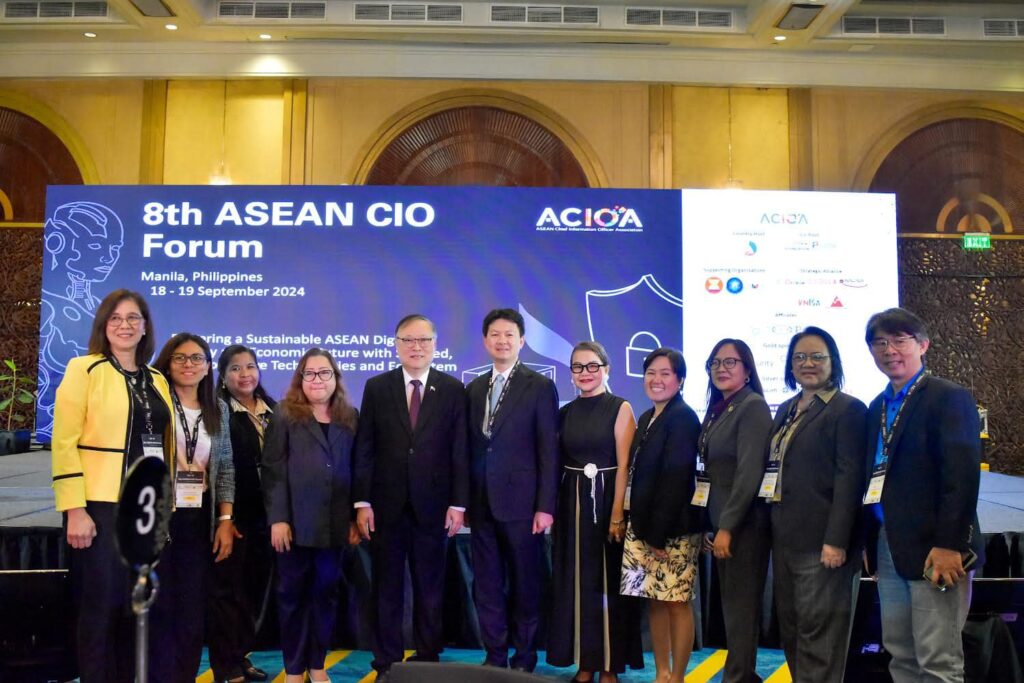
DICT Secretary Uy (5th from left), and Kwek Song Hin (7th from left), Strategist and Global Relationship Officer and co-founder of ASEAN CIO, together with (from left:) DICT Regional Director (RD) Cheryl Ortega, RD Evamay Dela Rosa, RD Pinky Jimenez, Atty. Jocelle Batapa-Sigue, HE Sok Puthyvuth, DICT Director Yesly Jaen, RD Sittie Rahma Alawi, Pia Grace Sabate and Sunny Lim.
ASEAN CIO Forum: What it hopes to achieve and how it all started
In an exclusive interview on the sidelines of the event, Kwek Song Hin, a trailblazer in the technology and finance sectors and also the forum’s co-founder, shared the history of the association, recounting its inception in 2010. She stated that the forum was borne out of the need for a collaborative platform where CIOs across the ASEAN can exchange insights and address shared technological challenges.
“When we first started, it was very informal, but we realized there was a critical need for C-suite executives to share real-world experiences in adopting technologies,” Kwek said. “This is especially vital for avoiding costly mistakes in digital transformation.”
According to Kwek, the CIO forum is structured on eight strategic chapters: cybersecurity and governance; blockchain, robotics and AI; digital livable cities; digital leadership; digital transformation; as well as green and sustainability, among others. She shared that despite efforts from multiple working groups, regional cybersecurity networks, and Interpol collaborations, the reluctance of organizations to share sensitive data still poses a significant challenge.
“Hackers are sharing information across borders; we need to match their collaboration if we are to keep up,” she urged, pointing out that the forum seeks to strengthen regional knowledge-sharing frameworks.
The COVID-19 pandemic also brought new perspectives to the forefront.
The CIO Association’s shift to virtual engagement through weekly digital live chats allowed ASEAN’s tech leaders to maintain vital discussions during lockdowns, ensuring that collaboration and knowledge exchange continued unabated. The live chat format was well-received, fostering stronger ties among CIOs across ASEAN.
Kwek has played a pivotal role in shaping the region’s digital landscape, starting with her founding of a boutique cybersecurity distribution house in 2001. Her work of establishing Asia’s first Federated Security Operation Center and her leadership at organizations like Netwitness and Narus, a Boeing subsidiary, has positioned her as a central figure in enhancing cybersecurity frameworks across the region.
Spearheading ASEAN’s digital future
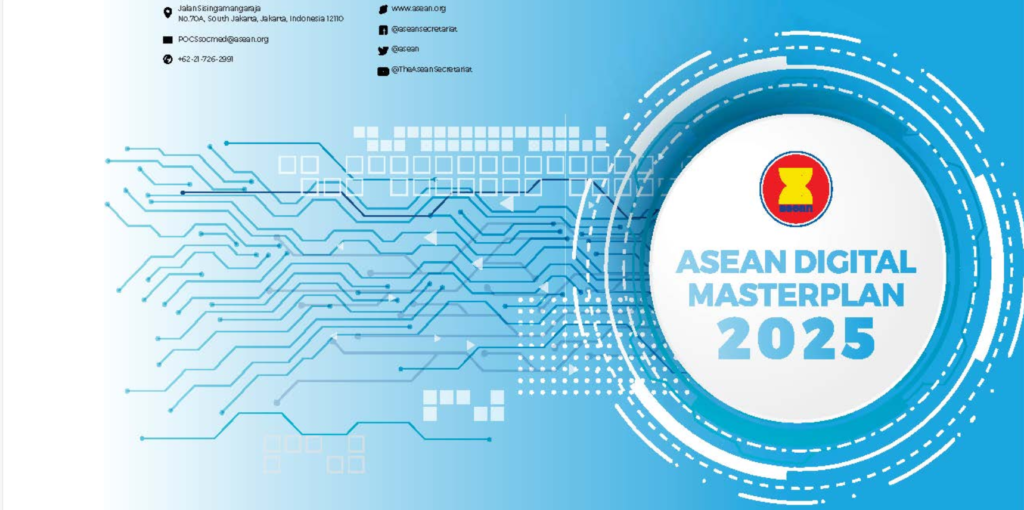
The discussions at the forum were rooted in the ASEAN Digital Masterplan 2025 (ADM), which aims to build a sustainable and inclusive digital economy for the region. Key elements of the ADM include advancing digital infrastructure, fostering cross-border e-commerce, and supporting the growth of digital startups.
The 8th ASEAN CIO Forum provided insights into how these goals can be achieved through partnerships between governments, the private sector, and the broader ASEAN community. With the ASEAN Digital Masterplan 2025 guiding the event’s structure, it showcased how transformative technologies can bolster the region’s digital and economic future.
As ASEAN powers forward as an integrated economic bloc, the forum emphasized the critical role of digital transformation in supporting the region’s sustainable development goals.
By leveraging emerging technologies such as AI, blockchain, and green technologies, ASEAN has the potential to create a resilient, secure, and innovative digital society. The event concluded with a reaffirmation of the importance of collaboration among ASEAN member states.
The collective insights shared by experts and leaders at the forum will guide future efforts to secure a prosperous, sustainable, and digitally advanced ASEAN, paving the way for a future where technology can serve as the engine of economic growth and social good.




